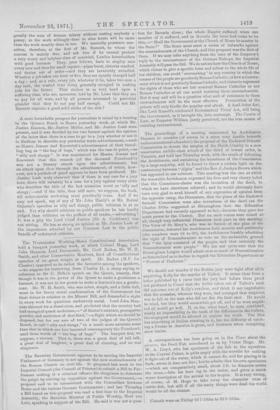The Bavarian Government appears to he moving the Imperial Parliament
of Germany to act against the new encroachments of the Roman Church on civil life. It proposed last week to the Imperial Council (the Council of Princes) to submit a Bill to Par- liament making it a criminal offence for clergymen to desecrate the pulpit by stirring up opposition against the Government,—a proposal said to be iucousistent with the Concordats between Rome and the various German Governments ; and last Thursday a Bill based on this proposal was read a first time in the Imperial Assembly, the Bavarian Minister of Public Worship, Herr von Lutz, speaking in support of the Bill. He said it was not a ques- tion for Bavaria alone ; the whole Empire suffered when one member of it suffered, and in Bavaria the issue had come to be this,—" Shall the Government or the Church of Rome be master in the State?" The State must erect a series of bulwarks against . the encroachments of the Church, and this proposal was the first of them. If we may infer anything from the tone of the Emperor's reply to the remonstrance of the German Bishops, the Imperial Assembly will pass the Bill. We do not see how the Church of Rome, which claims to give a specific form and colour to the whole life of her children, can avoid encroaehing ' in any country in which the masses of the people are genuinely Roman Catholic; or how a Govern- ment which is not genuinely Roman Catholic, and claims to represent the rights of those who are but nominal Roman Catholics or not Roman Catholics at all can avoid resisting these encroachments. But it may and will be a question what sort of resistance to these
encroachments will be the most effective. Persecution of the priests will only kindle the popular zeal afresh. A dead-letter Act, like Lord Russell's celebrated Ecclesiastical Titles' Act, will bring the Government, as it brought his, into contempt. The Courts of Law, as Emperor William justly perceived, are the true means of resisting encroachment.


































 Previous page
Previous page